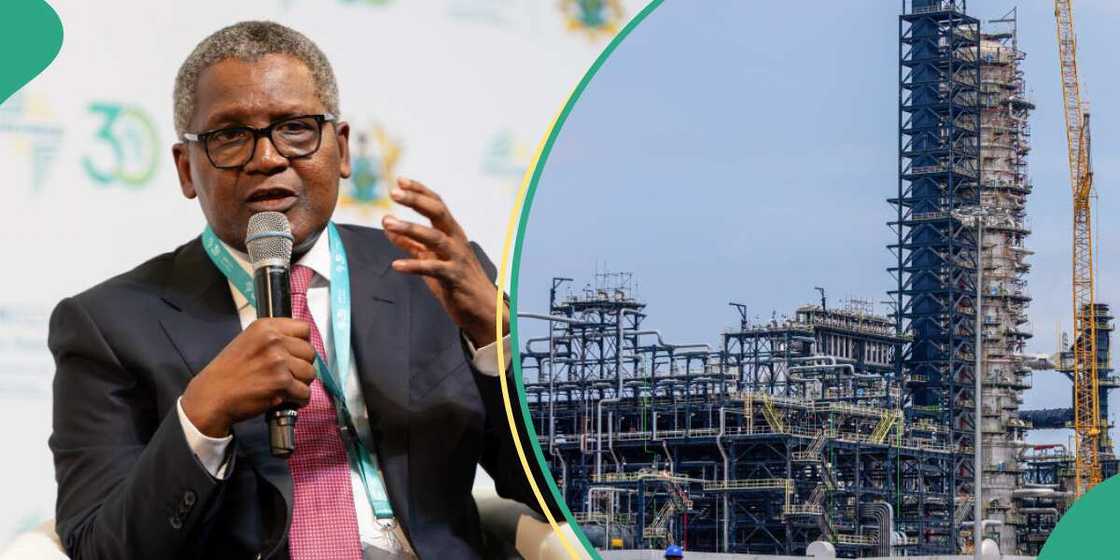“Nigeria’s Economy Will Suffer”: UK Agency Sounds Alarm on Lack of Crude Supply to Dangote Refinery
- The Economist Intelligence Unit (EIU) has predicted doom for the Nigerian economy if the Dangote Refinery fails
- The organisation said in its report that a delay in supplying crude oil to the facility could further destroy Nigeria’s economy
- It said that the failure could also damage the performance of the naira, leading to more economic hardship in the country
Legit.ng’s Pascal Oparada has reported on tech, energy, stocks, investment and the economy for over a decade.
The Economist Intelligence Unit (EIU) has issued a strong warning on the effect of delay in supplying crude oil to the Dangote Refinery on the Nigerian economy.
The EIU said further delays in providing feedstock to the 650,000 bpd-capacity refinery could further ruin Nigeria’s economic recovery and put additional pressure on the naira.

Source: Getty Images
Dangote Refinery postpones petrol production
The research and analysis firm disclosed that the Dangote Refinery has encountered setbacks in petrol production due to a shortage of crude oil since it began operations in January 2024.
PAY ATTENTION: Сheck out news that is picked exactly for YOU ➡️ find the “Recommended for you” block on the home page and enjoy!
The UK firm stated that the facility has successfully exported various products, including fuel oil, naphtha, nitrogen fertilisers, gasoil, jet fuel, and diesel, to other countries, including Singapore, opening up new trading routes.
However, the plant has been unable to ramp up petrol production due to challenges in crude oil supply.
According to reports, the delays are expected to have enormous economic consequences, potentially worsening the relationship between the public finances and the naira management.
IOCs make harsh demands from Dangote Refinery
According to EIU’s analysis, despite the government scrapping petrol subsidies in 2023, subsidising the product unofficially continues, affecting the national budget.
It stressed that this has led to increased currency losses, contributing to a growing budget deficit, becoming increasingly challenging to manage, and potentially forcing the CBN to use stricter currency management measures.
Local regulators have attributed the delay in securing crude oil for the $19 billion refinery to low crude production due to oil theft and underinvestment.
The report said that international oil companies (IOCs) operating in Nigeria have worsened the situation, demanding a $3-$4 premium per barrel over the prices they receive elsewhere.
Nigeria to benefit from locally producing fuel
EIU noted that regulators are reluctant to enforce Domestic Crude Supply Obligations (DCSO), requiring IOCs to sell crude to local refiners for fear of divestment.
The report pointed out that producing fuel locally will immensely benefit Nigeria’s fiscal position and currency, given that petroleum products account for 15% to 20% of Nigeria’s import bill.
Experts have said that the Lagos-based refinery could eliminate the need for fuel imports and protect local prices from exchange rate volatility.
EIU said:
Another Nigerian refinery postpones petrol production
Legit.ng earlier reported that the Nigerian National Petroleum Company Limited (NNPCL) had shelved the date for the much-awaited launch of the Port Harcourt Refinery for the sixth time.
The delay raises concerns about Nigeria’s energy infrastructure and the reliability of refining capabilities.
The refinery was initially slated to commence production in 2021 but has faced several delays, which have been attributed to various technical, financial and logistical issues.
Proofread by Kola Muhammed, journalist and copyeditor at Legit.ng
PAY ATTENTION: Unlock the best of Legit.ng on Pinterest! Subscribe now and get your daily inspiration!
Source: Legit.ng





